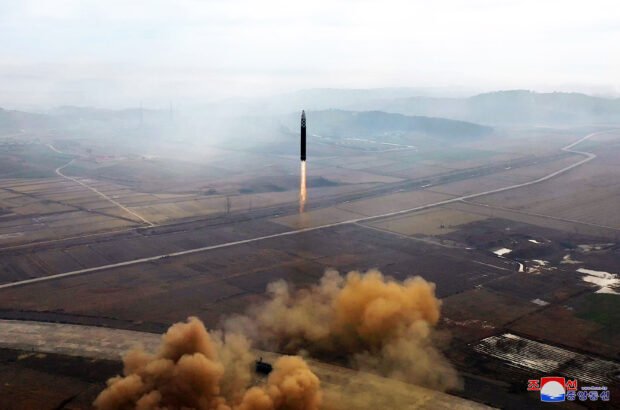

File picture taken on November 18, 2022 and released from North Korea’s official Korean Central News Agency (KCNA) on November 19, 2022 shows the launch of a new intercontinental ballistic missile (ICBM) ‘Hwasong Gun 17,’ at Pyongyang International Airport. North Korean leader Kim Jong Un said he would respond to US threats with nuclear weapons, state media said on November 19, after Kim personally oversaw Pyongyang’s latest launch of an intercontinental ballistic missile. (Photo by KCNA VIA KNS / AFP)
North Korea fired a short-range ballistic missile on Sunday, Seoul’s military said, as the United States and South Korea warned any nuclear attack would lead to the end of Pyongyang’s regime.
“Our military detected a short-range ballistic missile launched from the Pyongyang area towards the East Sea at around 22:38 (1338 GMT) on Sunday,” Seoul’s Joint Chiefs of Staff said, referring to the body of water also known as the Sea of Japan.
The missile flew around 570 kilometers (354 miles) before landing in the East Sea, it said, adding that Seoul, Washington, and Tokyo have “closely shared information regarding North Korea’s ballistic missile.”
Japan’s defense ministry also said North Korea launched “what appears to be a ballistic missile,” with its coastguard adding that it seemed to have already fallen.
The test comes as Seoul and Washington warned Pyongyang that any nuclear attack on the United States and South Korea would result in the end of the North Korean regime.
The two allies on Friday held their second session of the Nuclear Consultative Group in Washington, where they discussed nuclear deterrence in the event of conflict with the North.
A spokesperson for the North’s defense ministry on Sunday slammed the allies’ plans to expand a key annual joint military exercise next year to include a nuclear operation drill and warned of “a preemptive and deadly counteraction.”
“This is an open declaration on nuclear confrontation to make the use of nuclear weapons against the DPRK a fait accompli,” the statement carried by KCNA news agency said, using the official acronym for North Korea.
“The hostile forces’ any attempt to use armed forces against the DPRK will face a preemptive and deadly counteraction,” it added.
The US Indo-Pacific Command said in a statement that while the launch did not pose a threat to US territory or to Washington’s allies, it highlighted “the destabilizing impact of the DPRK’s illicit weapons program.”
“The US commitment to the defense of the Republic of Korea and Japan remains ironclad,” it added.
‘Irreversible’
The missile launch also comes as Pyongyang marks the anniversary of the death of leader Kim Jong Un’s father and predecessor, Kim Jong Il, who died on December 17, 2011.
North Korea last year declared itself an “irreversible” nuclear power and has repeatedly said it will never give up its nuclear program, which the regime views as essential for its survival.
And last month Pyongyang successfully put a military spy satellite into orbit.
It has since claimed its eye in the sky was already providing images of major US and South Korean military sites.
The United Nations Security Council has adopted many resolutions calling on North Korea to halt its nuclear and ballistic missile programs since it first conducted a nuclear test in 2006.
